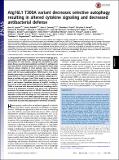Atg16L1 T300A variant decreases selective autophagy resulting in altered cytokine signaling and decreased antibacterial defense
Author(s)
Lassen, Kara G.; Kuballa, Petric; Conway, Kara L.; Patel, Khushbu; Becker, Christine E.; Peloquin, Joanna M.; Villablanca, Eduardo J.; Norman, Jason M.; Liu, Ta-Chung; Heath, Robert J. W.; Becker, Morgan L.; Fagbami, Lola; Horn, Heiko; Mercer, Johnathan; Yilmaz, Omer; Jaffe, Jacob D.; Shamji, Alykhan F.; Bahn, Atul K.; Carr, Steven A.; Daly, Mark J.; Virgin, Herbert W.; Schreiber, Stuart L.; Stappenbeck, Thaddeus S.; Xavier, Ramnik J.; ... Show more Show less
DownloadLassen-2014-Atg16L1 T300A varian.pdf (1.141Mb)
PUBLISHER_POLICY
Publisher Policy
Article is made available in accordance with the publisher's policy and may be subject to US copyright law. Please refer to the publisher's site for terms of use.
Terms of use
Metadata
Show full item recordAbstract
A coding polymorphism (Thr300Ala) in the essential autophagy gene, autophagy related 16-like 1 (ATG16L1), confers increased risk for the development of Crohn disease, although the mechanisms by which single disease-associated polymorphisms contribute to pathogenesis have been difficult to dissect given that environmental factors likely influence disease initiation in these patients. Here we introduce a knock-in mouse model expressing the Atg16L1 T300A variant. Consistent with the human polymorphism, T300A knock-in mice do not develop spontaneous intestinal inflammation, but exhibit morphological defects in Paneth and goblet cells. Selective autophagy is reduced in multiple cell types from T300A knock-in mice compared with WT mice. The T300A polymorphism significantly increases caspase 3- and caspase 7-mediated cleavage of Atg16L1, resulting in lower levels of full-length Atg16Ll T300A protein. Moreover, Atg16L1 T300A is associated with decreased antibacterial autophagy and increased IL-1β production in primary cells and in vivo. Quantitative proteomics for protein interactors of ATG16L1 identified previously unknown nonoverlapping sets of proteins involved in ATG16L1-dependent antibacterial autophagy or IL-1β production. These findings demonstrate how the T300A polymorphism leads to cell type- and pathway-specific disruptions of selective autophagy and suggest a mechanism by which this polymorphism contributes to disease.
Date issued
2014-05Department
Koch Institute for Integrative Cancer Research at MITJournal
Proceedings of the National Academy of Sciences
Publisher
National Academy of Sciences (U.S.)
Citation
Lassen, K. G., P. Kuballa, K. L. Conway, K. K. Patel, C. E. Becker, J. M. Peloquin, E. J. Villablanca, et al. “Atg16L1 T300A Variant Decreases Selective Autophagy Resulting in Altered Cytokine Signaling and Decreased Antibacterial Defense.” Proceedings of the National Academy of Sciences 111, no. 21 (May 12, 2014): 7741–7746.
Version: Final published version
ISSN
0027-8424
1091-6490